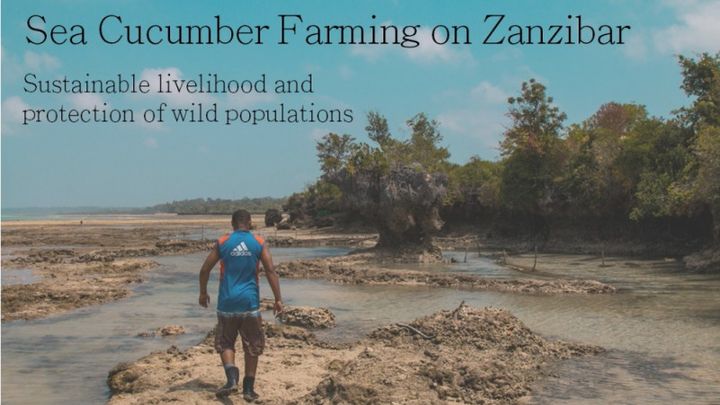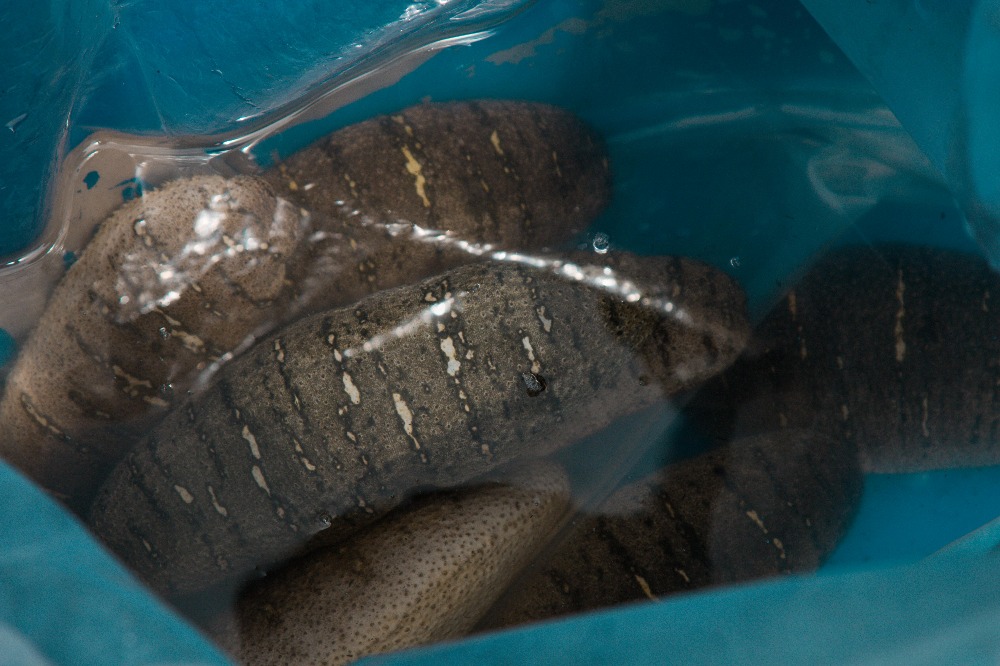
Make Sea Cucumbers Great Again
Donation protected
Jambo!
My name is Nuri Max Steinmann and I am currently a second-year student of the International Master of Science in Marine Biodiversity and Conservation (EMBC+) programme (http://www.embcplus.org/). My thesis project will be carried out in cooperation with the Leibniz Centre for Tropical Marine Research (ZMT Bremen), in Germany, the Galway-Mayo Institute of Technology, in Ireland and the Institute of Marine Science (IMS), on Zanzibar, Tanzania.
As part of my dissertation project I am spending three months on Zanzibar to conduct vital research on sea cucumber genetics, and most importantly to gather new insights into the interactions between sea cucumber aquaculture, wild populations and the livelihood of local fishermen.
What are sea cucumbers?
Sea cucumbers are among the least appealing animals on this planet. They are not only called like a vegetable, they also look like one, but they are actually quite interesting marine animals. Besides their wide variety of colours and sizes, their importance as natural vacuum cleaners for marine ecosystems, they have also gained a lot of interest for some other features, which do not seem so obvious. How can an animal which looks like a vegetable and has no brain be so interesting to so many people?

Why is studying sea cucumbers important?
There is a high demand for sea cucumbers in Asian markets, where they are considered as luxury seafood (Prices go up to 200$ per dried kg), an aphrodisiac, and believed to have certain compounds which kill cancer cells. As a consequence, sea cucumber populations are being globally overfished, exploited and exported to Asia. Driven by the ongoing decline of wild populations, the aquaculture and sea-ranching of valuable sea cucumbers species, have become an important and viable livelihood activity for coastal communities in developing countries.
The farming of sea cucumbers is thought to not only provide an economic value for local communities, but to also reduce the fishing pressure on wild populations. The farming of sea cucumbers is mostly carried out in sea-ranching systems. Sea-ranching is defined as the introduction of juveniles (either hatchery-produced or wild-caught) into the natural environment until they reached the desired size.

However, the consequences of genetic interactions between hatchery-reared and wild individuals are often poorly understood and a major problem in sea-ranching projects. For instance, hatchery-reared sea urchins have been shown to have a reduced genetic diversity and may negatively affect the genetics of wild populations. The mixing of cultured and wild sea cucumber populations may also display a genetic risk, due to the threat of inbreeding and loss of genetic integrity, which could reduce the overall resilience of local populations. Therefore, the preservation of genetic diversity must be considered in adequate management strategies of sea cucumber farming projects.
Why study sea cucumbers in Zanzibar?
Over the last years the development of an aquaculture sector in Zanzibar has been implemented, including the production of valuable sea cucumber species. The sea cucumber hatchery programme is part of Zanzibar’s aquaculture development project which is run by the government of Zanzibar in partnership with the Food and Agriculture Organization of the United Nations (FAO).

The overall all goal of the FAO project is to supply juvenile sea cucumbers to local outgrow farmers and to restock wild populations. Until today, outgrow farmers obtain juveniles from other local fishermen, who collect them from the wild. Consequently, a sustainable production of hatchery-reared sea cucumbers has the potential to protect and restock wild populations, but only if management strategies consider the preservation of genetic diversity.
My research project
As part of my project we will try to reproduce sea cucumbers under controlled conditions for further aquaculture use and restocking procedures.
Furthermore, the need of new baseline data on the genetic structure and relationships of sea cucumber populations, has opened new opportunities to conduct genetic studies in areas were sea-ranching is carried out. My thesis project aims to investigate the population structure of wild and farmed communities of the sea cucumber species Holothuria scabra on Zanzibar.

Additionally, I want to investigate the status quo of sea cucumber farming in Zanzibar (Where? Who? How?) and discover the potential of co-culturing sea cucumbers with other species (More information: https://en.wikipedia.org/wiki/Integrated_multi-trophic_aquaculture).
How am I going to do that?
While most genetic studies use destructive sampling methods (Killing the animal! ☹), non-destructive sampling is more suitable when dealing with high value species, and more compatible with animal welfare concepts. I will use sterile swabs, which look like the cotton sticks you use to clean your ears, to take genetic samples of different communities at potential sea-ranching grounds and from the hatchery. The analysis of the samples will be carried out in the laboratory facilities at the ZMT Bremen, Germany.
To learn more about the sea cucumber farming on Zanzibar in general, and what further potential it has, I will work closely together with the local scientists of the IMS and the FAO, visit their facilities and employees, and document the work they carry out.

What are the costs?
Some costs for field work and the subsequent analysis in the laboratory are already covered by the Kellner & Stoll - Foundation for Climate and Environment (http://www.stiftung-klima-umwelt.org/seegurken-aquakultur-vor-sansibar.html). However, there is still a gap of 1370 Euro (Research visa 310 Euro, flights 610 Euro, and logistics 450 Euro). The costs for accommodation and living are covered by myself.
If you would like to get behind this project and help to fund some exciting sea cucumber research project in Zanzibar, which will hopefully contribute to a more sustainable future of sea cucumbers and fishermen alike, then please use one of the options below. Every donation would help me a lot.
Thank you for your support or Ahsante sana!
My name is Nuri Max Steinmann and I am currently a second-year student of the International Master of Science in Marine Biodiversity and Conservation (EMBC+) programme (http://www.embcplus.org/). My thesis project will be carried out in cooperation with the Leibniz Centre for Tropical Marine Research (ZMT Bremen), in Germany, the Galway-Mayo Institute of Technology, in Ireland and the Institute of Marine Science (IMS), on Zanzibar, Tanzania.
As part of my dissertation project I am spending three months on Zanzibar to conduct vital research on sea cucumber genetics, and most importantly to gather new insights into the interactions between sea cucumber aquaculture, wild populations and the livelihood of local fishermen.
What are sea cucumbers?
Sea cucumbers are among the least appealing animals on this planet. They are not only called like a vegetable, they also look like one, but they are actually quite interesting marine animals. Besides their wide variety of colours and sizes, their importance as natural vacuum cleaners for marine ecosystems, they have also gained a lot of interest for some other features, which do not seem so obvious. How can an animal which looks like a vegetable and has no brain be so interesting to so many people?

Why is studying sea cucumbers important?
There is a high demand for sea cucumbers in Asian markets, where they are considered as luxury seafood (Prices go up to 200$ per dried kg), an aphrodisiac, and believed to have certain compounds which kill cancer cells. As a consequence, sea cucumber populations are being globally overfished, exploited and exported to Asia. Driven by the ongoing decline of wild populations, the aquaculture and sea-ranching of valuable sea cucumbers species, have become an important and viable livelihood activity for coastal communities in developing countries.
The farming of sea cucumbers is thought to not only provide an economic value for local communities, but to also reduce the fishing pressure on wild populations. The farming of sea cucumbers is mostly carried out in sea-ranching systems. Sea-ranching is defined as the introduction of juveniles (either hatchery-produced or wild-caught) into the natural environment until they reached the desired size.

However, the consequences of genetic interactions between hatchery-reared and wild individuals are often poorly understood and a major problem in sea-ranching projects. For instance, hatchery-reared sea urchins have been shown to have a reduced genetic diversity and may negatively affect the genetics of wild populations. The mixing of cultured and wild sea cucumber populations may also display a genetic risk, due to the threat of inbreeding and loss of genetic integrity, which could reduce the overall resilience of local populations. Therefore, the preservation of genetic diversity must be considered in adequate management strategies of sea cucumber farming projects.
Why study sea cucumbers in Zanzibar?
Over the last years the development of an aquaculture sector in Zanzibar has been implemented, including the production of valuable sea cucumber species. The sea cucumber hatchery programme is part of Zanzibar’s aquaculture development project which is run by the government of Zanzibar in partnership with the Food and Agriculture Organization of the United Nations (FAO).

The overall all goal of the FAO project is to supply juvenile sea cucumbers to local outgrow farmers and to restock wild populations. Until today, outgrow farmers obtain juveniles from other local fishermen, who collect them from the wild. Consequently, a sustainable production of hatchery-reared sea cucumbers has the potential to protect and restock wild populations, but only if management strategies consider the preservation of genetic diversity.
My research project
As part of my project we will try to reproduce sea cucumbers under controlled conditions for further aquaculture use and restocking procedures.
Furthermore, the need of new baseline data on the genetic structure and relationships of sea cucumber populations, has opened new opportunities to conduct genetic studies in areas were sea-ranching is carried out. My thesis project aims to investigate the population structure of wild and farmed communities of the sea cucumber species Holothuria scabra on Zanzibar.

Additionally, I want to investigate the status quo of sea cucumber farming in Zanzibar (Where? Who? How?) and discover the potential of co-culturing sea cucumbers with other species (More information: https://en.wikipedia.org/wiki/Integrated_multi-trophic_aquaculture).
How am I going to do that?
While most genetic studies use destructive sampling methods (Killing the animal! ☹), non-destructive sampling is more suitable when dealing with high value species, and more compatible with animal welfare concepts. I will use sterile swabs, which look like the cotton sticks you use to clean your ears, to take genetic samples of different communities at potential sea-ranching grounds and from the hatchery. The analysis of the samples will be carried out in the laboratory facilities at the ZMT Bremen, Germany.
To learn more about the sea cucumber farming on Zanzibar in general, and what further potential it has, I will work closely together with the local scientists of the IMS and the FAO, visit their facilities and employees, and document the work they carry out.

What are the costs?
Some costs for field work and the subsequent analysis in the laboratory are already covered by the Kellner & Stoll - Foundation for Climate and Environment (http://www.stiftung-klima-umwelt.org/seegurken-aquakultur-vor-sansibar.html). However, there is still a gap of 1370 Euro (Research visa 310 Euro, flights 610 Euro, and logistics 450 Euro). The costs for accommodation and living are covered by myself.
If you would like to get behind this project and help to fund some exciting sea cucumber research project in Zanzibar, which will hopefully contribute to a more sustainable future of sea cucumbers and fishermen alike, then please use one of the options below. Every donation would help me a lot.
Thank you for your support or Ahsante sana!
Organizer
Nuri Steinmané
Organizer


